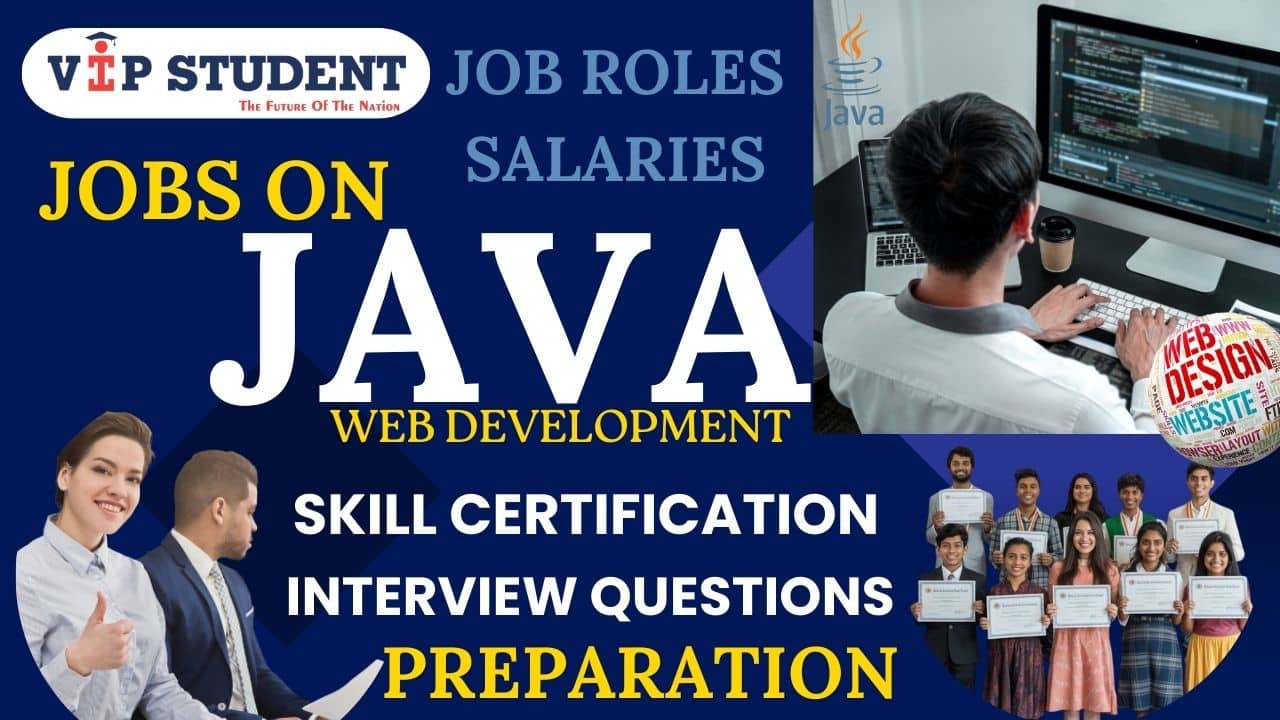LET’S KNOW ABOUT JAVA JOB ROLES, REQUIRED SKILLS, SALARY PARTICULARS, PRACTICE JOB INTERVIEW QUESTIONS AND GET CERTIFIED ON JAVA PROGRAMING LANGUAGE SKILLS
JOBS ON JAVA PROGRAMING LANGUAGE SKILLS: Java is one of the most widely used programming languages in the world, especially known for its versatility, platform independence, and use in enterprise-level applications. From building Android apps to creating complex web and enterprise systems, Java developers are in high demand across the globe. Whether you’re a job seeker or a student planning your career, let’s know about JAVA job roles, required skills, practice on job interview questions and get certified on your JAVAprograming language skills.
👨💻JOBS ON JAVA AND CAREER OPPORTUNITIES
Java is a powerful, object-oriented programming language widely used in enterprise applications, web development, mobile apps, and more. Java continues to dominate the job market, making it a top choice for aspiring developers. Java skills open doors to several specialized job roles in software development. Here are the most common positions:
🔹 Java Developer
Focuses on backend logic, APIs, and enterprise-level application development using Java SE and EE.
🔹 Java Full Stack Developer
Combines frontend and backend development using Java (Spring Boot) for backend and Angular/React for frontend.
🔹 Android Developer (Java-based)
Uses Java (or Kotlin) to build Android apps. Familiarity with Android Studio, XML, and SDKs is essential.
🔹 Software Engineer (Java)
Applies Java skills in end-to-end development, testing, and deployment of software products.
🔹 Java Architect
Designs scalable architectures using advanced Java frameworks and microservices. Involves leadership and planning.
🎓Core Skills Required for Java Jobs
To succeed in Java roles, you need a strong combination of technical and soft skills.
🔸 Core Java
Understand OOPs, data types, loops, collections, multithreading, exception handling, and file I/O.
🔸 Java Frameworks
Master frameworks like Spring, Spring Boot, Hibernate, and Struts for rapid development.
🔸 Web Technologies
Knowledge of JSP, Servlets, HTML, CSS, and JavaScript helps in full stack and web roles.
🔸 Databases
Proficiency in SQL and experience with databases like MySQL, PostgreSQL, or Oracle.
🔸 APIs and Web Services
Know how to build and consume RESTful APIs and use tools like Postman.
🔸 Tools and IDEs
Use Eclipse, IntelliJ IDEA, Git, Maven/Gradle, and Jenkins for efficient development and CI/CD.
🔸 Soft Skills
Strong problem-solving, communication, and teamwork skills are essential in collaborative environments.
💼 Job Opportunities and Industries
Java professionals are in demand in various industries due to Java’s versatility and robust ecosystem.
🌐 Industries Hiring Java Professionals:
- IT Services & Consulting – Infosys, TCS, Capgemini
- Product Companies – Google, Amazon, Oracle
- Banking & Finance – HDFC, Axis Bank, JP Morgan
- Healthcare Tech – Siemens Healthineers, Practo
- E-commerce – Flipkart, Meesho,
💰 Detailed Salary Particulars for Java Job Roles (India)
🔹 1. Java Developer
| Experience Level | Average Annual Salary | Top Cities (Higher Range) |
|---|---|---|
| 0–1 years (Fresher) | ₹3 – ₹5 LPA | Pune, Noida, Bengaluru |
| 2–4 years | ₹5 – ₹8 LPA | Bengaluru, Hyderabad, Chennai |
| 5–8 years | ₹9 – ₹14 LPA | Gurugram, Mumbai, Bengaluru |
| 8+ years (Lead Role) | ₹15 – ₹22 LPA | Bengaluru, Pune, Hyderabad |
🔹 2. Java Full Stack Developer
| Experience Level | Average Annual Salary | Notes |
|---|---|---|
| 0–2 years | ₹4 – ₹6 LPA | Knowledge of both frontend/backend is a must |
| 3–5 years | ₹8 – ₹12 LPA | Hands-on with Spring Boot + Angular/React |
| 6+ years | ₹14 – ₹20 LPA | Can lead full-stack teams |
🔹 3. Android Developer (Java-based)
| Experience Level | Average Annual Salary | Notes |
|---|---|---|
| 0–2 years | ₹3 – ₹6 LPA | Entry-level, often requires Java + XML |
| 3–5 years | ₹7 – ₹11 LPA | May include Firebase, SQLite, REST |
| 6+ years | ₹12 – ₹18 LPA | Often leads mobile app development teams |
🔹 4. Software Engineer (Java Technology)
| Experience Level | Average Annual Salary | Common in |
|---|---|---|
| 0–2 years | ₹3.5 – ₹6 LPA | Product & service-based companies |
| 3–5 years | ₹6 – ₹10 LPA | Involves advanced Java + cloud tools |
| 6+ years | ₹12 – ₹18 LPA | Often moves into architecture or lead roles |
🔹 5. Java Architect / Senior Java Developer
| Experience Level | Average Annual Salary | Expectations |
|---|---|---|
| 8–10 years | ₹20 – ₹28 LPA | Design-level responsibilities |
| 10+ years | ₹25 – ₹40 LPA+ | Enterprise architecture, cloud, microservices |
🏢 Top Paying Companies for Java Roles
| Company Name | Average Java Developer Salary |
|---|---|
| TCS | ₹3 – ₹8 LPA |
| Infosys | ₹3 – ₹7.5 LPA |
| Wipro | ₹3.5 – ₹8 LPA |
| Capgemini | ₹4 – ₹10 LPA |
| Cognizant | ₹4 – ₹9 LPA |
| Accenture | ₹5 – ₹12 LPA |
| IBM | ₹6 – ₹15 LPA |
| Oracle | ₹8 – ₹18 LPA |
| Amazon / Google | ₹15 – ₹40+ LPA |
| Product Startups | ₹10 – ₹25+ LPA |
📍 City-Wise Salary Trends (for Java Developers)
| City | Entry Level (0–2 yrs) | Mid-Level (3–6 yrs) | Senior (7+ yrs) |
|---|---|---|---|
| Bengaluru | ₹4 – ₹6.5 LPA | ₹8 – ₹12 LPA | ₹15 – ₹25 LPA |
| Hyderabad | ₹3.5 – ₹6 LPA | ₹7 – ₹11 LPA | ₹13 – ₹22 LPA |
| Pune | ₹3 – ₹5.5 LPA | ₹6 – ₹10 LPA | ₹12 – ₹20 LPA |
| Mumbai | ₹3.5 – ₹6.5 LPA | ₹7 – ₹11 LPA | ₹14 – ₹22 LPA |
| Chennai | ₹3 – ₹5.5 LPA | ₹6.5 – ₹9.5 LPA | ₹12 – ₹18 LPA |
| Gurugram | ₹4 – ₹7 LPA | ₹8 – ₹13 LPA | ₹15 – ₹24 LPA |
🎓 Education & Certifications
📘 Educational Qualifications:
- B.Tech/B.E. in Computer Science or IT
- MCA or MSc in Computer Applications (optional but valuable)
📜 Popular Certifications:
- Oracle Certified Java Programmer (OCJP)
- Oracle Certified Java Developer (OCJD)
- Spring Professional Certification
- Google Associate Android Developer
Certifications increase job prospects and salary offers.
📈 Career Growth Path in Java
Java offers a promising career ladder. Here’s a typical progression:
- Junior Java Developer (Fresher – 2 years)
- Mid-Level Developer (3–5 years)
- Senior Developer (5–8 years)
- Technical Lead (8–10 years)
- Java Architect / Engineering Manager (10+ years)
Professionals can also pivot into DevOps, Cloud Engineering, or Software Architecture roles.
📝 How to Land a Java Job
Here are some useful tips to boost your Java career:
- ✅ Build projects and share them on GitHub
- ✅ Prepare for coding interviews (DSA, OOPs, SQL)
- ✅ Attend Java webinars, tech conferences, or bootcamps
- ✅ Update your resume with Java skills and certifications
- ✅ Practice mock interviews on platforms like InterviewBit or LeetCode
General job interview questions and sample answers tailored for Java job roles
1. What is Java?
Java is a high-level, class-based, object-oriented programming language that is platform-independent due to its use of the Java Virtual Machine (JVM).
2. What are the main features of Java?
Key features include object-oriented, platform-independent, robust, secure, multithreaded, and architecture-neutral.
3. What is the JVM?
The Java Virtual Machine (JVM) is an engine that provides a runtime environment to execute Java bytecode, making Java platform-independent.
4. What is the JDK?
The Java Development Kit (JDK) is a software development kit used to develop Java applications. It includes the JRE and development tools like javac and javadoc.
5. What is the JRE?
Java Runtime Environment (JRE) is a part of JDK that provides the libraries and JVM required to run Java applications.
6. What is the difference between JDK, JRE, and JVM?
- JVM: Executes bytecode
- JRE: Provides JVM + libraries
- JDK: Includes JRE + development tools
7. Is Java a compiled or interpreted language?
Java is both. Java code is compiled to bytecode, which is then interpreted or compiled at runtime by the JVM.
8. What are the data types in Java?
Java has primitive types (int, float, double, boolean, etc.) and reference types (objects, arrays).
9. What is the difference between == and equals()?
== checks reference equality, while equals() checks logical equality.
10. What is a constructor in Java?
A constructor is a special method used to initialize objects and is invoked when an object is created.
11. What is the difference between a class and an object?
A class is a blueprint, while an object is an instance of the class.
12. What is inheritance in Java?
Inheritance allows one class to acquire the properties and behaviors of another class using the extends keyword.
13. What is polymorphism?
Polymorphism allows objects to be treated as instances of their parent class. It can be compile-time (method overloading) or runtime (method overriding).
14. What is encapsulation?
Encapsulation is the concept of wrapping data and methods into a single unit (class) and restricting access using access modifiers.
15. What is abstraction?
Abstraction hides internal implementation details and only shows the essential features of an object.
16. What are access modifiers in Java?
Access modifiers define visibility: private, default, protected, and public.
17. What is method overloading?
Method overloading occurs when multiple methods have the same name but different parameters.
18. What is method overriding?
Method overriding occurs when a subclass provides a specific implementation for a method already defined in its superclass.
19. Can a constructor be overridden?
No, constructors cannot be overridden as they are not inherited.
20. What is the final keyword?
The final keyword is used to restrict classes, methods, and variables from being modified.
21. What is an interface in Java?
An interface is a reference type with abstract methods that classes can implement using the implements keyword.
22. What is the difference between an abstract class and an interface?
An abstract class can have implemented methods; an interface can only have abstract methods (until Java 8, where default methods were introduced).
23. What are static methods and variables?
Static methods/variables belong to the class rather than any instance.
24. What is a package in Java?
A package is a namespace that organizes classes and interfaces logically.
25. What is exception handling?
Exception handling allows you to manage runtime errors using try, catch, finally, throw, and throws.
26. What is the difference between checked and unchecked exceptions?
Checked exceptions are checked at compile time; unchecked are checked at runtime.
27. What is the purpose of the finally block?
The finally block executes code regardless of whether an exception is thrown or caught.
28. What is multithreading in Java?
Multithreading allows concurrent execution of two or more threads for better CPU utilization.
29. What is synchronization?
Synchronization controls the access of multiple threads to shared resources.
30. What is the difference between ArrayList and LinkedList?
ArrayList is better for random access; LinkedList is better for frequent insertion/deletion.
31. What is the difference between HashMap and Hashtable?
HashMap is not synchronized, while Hashtable is synchronized.
32. What is the difference between Array and ArrayList?
Arrays are fixed in size and can hold both primitives and objects. ArrayList is resizable and holds only objects.
33. What is the this keyword?
this refers to the current object instance.
34. What is the super keyword?
super is used to refer to the immediate parent class object.
35. What is garbage collection?
Garbage collection is the process of reclaiming memory used by unreferenced objects.
36. What is the purpose of the finalize() method?
It’s called by the garbage collector before destroying an object.
37. What is the difference between String, StringBuffer, and StringBuilder?
Stringis immutableStringBufferis mutable and thread-safeStringBuilderis mutable but not thread-safe
38. What are the types of inner classes in Java?
Types include static nested classes, non-static inner classes, local inner classes, and anonymous inner classes.
39. What is a lambda expression?
A lambda expression is a concise way to represent an anonymous function, introduced in Java 8.
40. What is the Stream API?
Stream API is used to process collections of objects in a functional style.
41. What is the difference between == and equalsIgnoreCase() in strings?
== compares references, while equalsIgnoreCase() compares string values ignoring case.
42. What is an enumeration (enum)?
An enum is a special class representing a group of constants.
43. What is a marker interface?
A marker interface does not contain methods but adds metadata (e.g., Serializable).
44. What is dependency injection in Java?
Dependency injection is a design pattern that allows injecting dependencies into a class, commonly used in frameworks like Spring.
45. What are design patterns?
Design patterns are standard solutions to common software design problems (e.g., Singleton, Factory, Observer).
46. What is a Singleton class?
A Singleton ensures that only one instance of a class is created and provides a global access point.
47. What is reflection in Java?
Reflection allows Java code to inspect and manipulate classes, methods, and fields at runtime.
48. What is a ClassLoader?
ClassLoader is part of JVM that loads classes during runtime.
49. What are functional interfaces?
Functional interfaces have a single abstract method and are used in lambda expressions.
50. What is the difference between throw and throws?
throw is used to explicitly throw an exception, while throws is used to declare exceptions in the method signature.
Practical job interview questions and sample answers focused on Java skills and applied knowledge
1. How do you create a thread in Java?
You can create a thread by either extending the Thread class or implementing the Runnable interface and passing it to a Thread object.
2. How do you handle synchronization in a multithreaded application?
By using the synchronized keyword on methods or blocks, or by using concurrent utilities like ReentrantLock.
3. How do you avoid deadlocks in Java?
Avoid nested locks, use timeout for lock acquisition, and always acquire locks in the same order.
4. How do you implement a Singleton class in Java?
Use a private constructor, a private static instance, and a public static method to return the instance. Optionally, use the enum type for thread-safety.
5. How do you reverse a string in Java without using built-in functions?
By converting it to a char array and swapping characters from the ends towards the center.
6. How do you find the duplicate elements in an array?
Use a HashSet to track elements and identify duplicates.
7. How do you implement a custom exception?
Extend the Exception class and create constructors to pass messages or causes.
8. How do you sort a list of objects by a specific field?
Use Collections.sort() with a custom Comparator or use Java 8’s stream().sorted().
9. How do you read a file in Java?
Use BufferedReader, Scanner, or Java NIO classes like Files.readAllLines().
10. How do you write to a file in Java?
Use BufferedWriter, FileWriter, or Files.write() from NIO package.
11. How do you implement a hash table manually?
Create an array of linked lists or arrays, use a hash function to map keys to indexes, and handle collisions via chaining or open addressing.
12. How do you handle null pointer exceptions?
By checking for null values explicitly or using Optional in Java 8+.
13. How do you use Java 8 streams to filter and collect data?
Use stream().filter(predicate).collect(Collectors.toList()).
14. How do you remove duplicates from a list?
Convert the list to a Set or use distinct() with streams.
15. How do you check if a string is a palindrome?
Compare the original string with its reversed version.
16. How do you convert a List to an array?
Use list.toArray(new Type[0]).
17. How do you convert an array to a List?
Use Arrays.asList(array) or List.of(array) in Java 9+.
18. How do you connect to a database in Java?
Use JDBC by loading the driver, creating a connection, preparing statements, and executing queries.
19. How do you handle SQL exceptions?
Use try-catch blocks around JDBC code and log the exception messages.
20. How do you implement pagination in Java?
Use LIMIT and OFFSET in SQL or sublist views in Java collections.
21. How do you serialize and deserialize an object in Java?
Implement Serializable, then use ObjectOutputStream and ObjectInputStream.
22. How do you compare two objects in Java?
Override equals() and hashCode() methods for logical equality.
23. How do you deep clone an object?
Use serialization or manually clone all referenced objects.
24. How do you create an immutable class?
Make the class final, make fields private and final, and don’t provide setters.
25. How do you implement dependency injection in Java?
Use frameworks like Spring or manually inject dependencies via constructors or setters.
26. How do you convert a string to a number in Java?
Use Integer.parseInt(), Double.parseDouble(), etc.
27. How do you validate an email address using regex in Java?
Use Pattern.matches("[a-zA-Z0-9._%+-]+@[a-zA-Z0-9.-]+\\.[a-z]{2,6}", email).
28. How do you schedule tasks in Java?
Use ScheduledExecutorService or Timer class.
29. How do you remove an element from a List while iterating?
Use an Iterator and call iterator.remove().
30. How do you measure the execution time of a method?
Use System.nanoTime() or System.currentTimeMillis() before and after the call.
31. How do you avoid memory leaks in Java?
Release unused references, close resources, and use weak references for caches.
32. How do you handle file uploads in Java web applications?
Use MultipartFile in Spring or Apache Commons FileUpload.
33. How do you consume a REST API in Java?
Use HttpURLConnection, HttpClient, or libraries like RestTemplate, WebClient, or OkHttp.
34. How do you expose a REST API in Java?
Use frameworks like Spring Boot with @RestController and @RequestMapping.
35. How do you parse JSON in Java?
Use libraries like Jackson, Gson, or org.json.
36. How do you create a thread-safe collection?
Use Collections.synchronizedList() or concurrent classes like CopyOnWriteArrayList.
37. How do you implement caching in Java?
Use Map structures with expiration logic or libraries like Ehcache, Caffeine.
38. How do you convert a date from one format to another?
Use SimpleDateFormat in Java 7 or DateTimeFormatter in Java 8+.
39. How do you generate random numbers in Java?
Use Random class, Math.random(), or ThreadLocalRandom.
40. How do you detect memory usage in a Java application?
Use Runtime.getRuntime().totalMemory() and freeMemory() methods.
41. How do you configure logging in Java?
Use java.util.logging, Log4j, or SLF4J with configuration files.
42. How do you convert between different data types safely?
Use proper parsing methods and handle NumberFormatException.
43. How do you flatten a nested list structure in Java?
Use recursion or Java 8 streams with flatMap.
44. How do you build a custom comparator for sorting?
Implement Comparator<T> and override compare() method.
45. How do you generate a UUID in Java?
Use UUID.randomUUID() method.
46. How do you implement a priority queue?
Use the PriorityQueue class and provide a custom comparator if needed.
47. How do you implement a stack or queue in Java?
Use Stack, LinkedList, or ArrayDeque.
48. How do you safely share data between threads?
Use synchronized, volatile, or concurrent collections.
49. How do you profile a Java application for performance?
Use tools like VisualVM, JProfiler, or Java Mission Control.
50. How do you test a Java application?
Use JUnit or TestNG for unit testing, Mockito for mocking, and integration tests with Spring Test.
GET CERTIFIED ON YOUR JAVA PROGRAMING LANGUAGE SKILLS AND KNOWLEDGE
GENERAL JOB INTERVIEW QUESTIONS AND SAMPLE ANSWERS
1. Tell me about yourself.
General Answer:
you have to tell about your self minimum 3 to 5 minits – Tell about your personal details like your name , parents and siblings and what they do , your location and its famous for, your acadamics like your school name, college name and mention marks you are obtained in 10th class, intermediate, graduation, post graduation (as per your education) and your school or college known for, your certification cources, your projects, your achivements , your tallents, your hobbies and skills you are good at like communication, problem-solving, and teamwork.
And conclude with “I’m looking forward to contributing my skills and strengths to a great/new organization while continuing to learn new skills and to develope my strengths.”
2. What are your strengths?
General Answer:
“My strengths include being organized, reliable, and a quick learner. I’m also good at working with others and staying calm under pressure.”
3. What is your greatest weakness?
General Answer:
“Sometimes I focus too much on details because I want everything to be perfect. However, I’ve been working on managing my time better and knowing when to move on to the next task.”
4. Why do you want to work here?
General Answer:
“I’ve heard positive things about the company’s culture and growth opportunities. I’m excited about the chance to work in an environment that values learning and teamwork.”
5. Why should we hire you?
General Answer:
“I believe I can bring value through my work ethic, adaptability, and eagerness to learn. I’m confident I can quickly become a productive member of your team.”
6. Where do you see yourself in 5 years?
General Answer:
“In five years, I hope to be in a position where I’ve gained more experience, taken on new challenges, and grown professionally within the company.”
7. Describe a challenge you’ve faced and how you handled it.
General Answer:
“I faced a situation where deadlines were tight and priorities were shifting. I stayed focused, managed my time well, and communicated clearly with my team, which helped us complete the project successfully.”
8. How do you handle stress and pressure?
General Answer:
“I try to stay calm and focused by organizing my tasks and taking short breaks when needed. I also talk to teammates or supervisors if I need support.”
9. Do you prefer to work independently or in a team?
General Answer:
“I’m comfortable with both. I enjoy collaborating and learning from others, but I can also stay focused and productive when working on my own.”
10. Do you have any questions for us?
General Answer:
“Yes, I’d like to know more about the daily responsibilities of the role and what the team culture is like.”
Jobs On JAVA Skills Conclusion:
Java continues to be a reliable and in-demand skill in the software industry. Whether you are just starting or looking to grow your career, mastering Java and its ecosystem can open up numerous job opportunities with attractive salaries and long-term growth.






